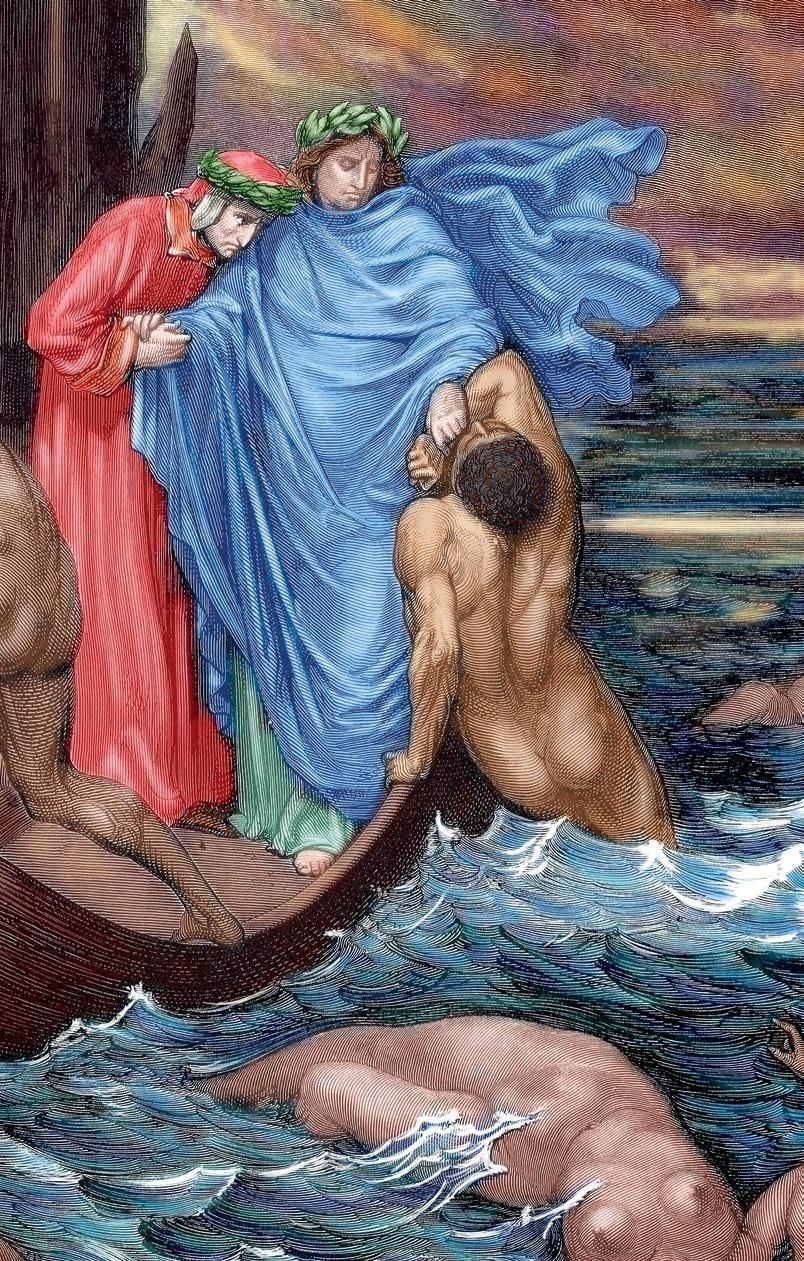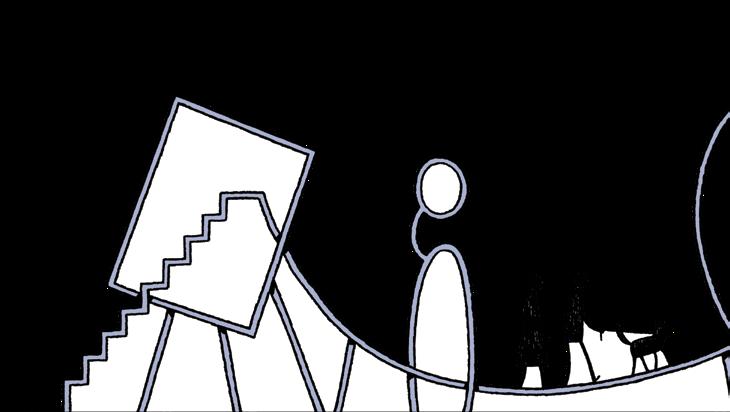
6 minute read
In praise of Dante, 700 years after his death A N Wilson
Dante died 700 years ago. AN Wilson salutes a master of love, poetry – and Christianity The God behind the Divine Comedy
In the mud and cold of Auschwitz, the great Italian writer Primo Levi was approached by an Alsatian Jew, who had never read Dante. Could Levi please explain why people spoke of this medieval poet in the same breath as Homer and Shakespeare, as one of the greatest European spirits?
Advertisement
Levi recited to him the 26th Canto of the Divine Comedy. It is the passage that describes the encounter with Ulysses. Dante and his guide through hell and purgatory, Virgil, have entered the infernal realms, and climbed down from circle to circle of hell, meeting now the doomed lovers Paolo and Francesca, now his old tutor everlastingly running on hot sands for the sin of sodomy, here forgers of currency, there corrupt clerics, here men Dante had known, there suicides, there drunkards, there the great villains of history, such as those pagan priests who egged on Agamemnon to perform the ritual killing of his daughter Iphigenia, to get a wind in the sails of the Greek fleet, bound for Troy; or the high priests who condemned Christ to death.
But in the 26th book, we encounter Ulysses. This is not the Odysseus of Homer. It is an intellectually and spiritually restless old man, probably best known to English readers as the Ulysses of Tennyson who was inspired by this passage in Dante to write his great poem.
Bored by life after his return to Ithaca, Dante’s Ulysses has set off with some of his old piratical shipmates to find the limits of the known world. They have sailed beyond the Pillars of Hercules and thereby sailed off the edge of the world. The lines that so appealed to Primo Levi are
Considerate la vostra semenza:
Fatti non foste a viver come bruti:
Ma per seguir virtute e canoscenza (Consider your roots. You were made not to live like mindless animals but to follow virtue and intelligent knowledge)
The setting in which Levi recited these lines makes many people choose this as an illustration of why Dante is one of the immortals. In a camp where humanity was reduced to sub-animal levels, where the Nazi horror was so great that even Dante in his most grotesque and furious modes could not have imagined it, Levi remembered this inspiring speech.
Dante – who died in Ravenna 700 years ago on September 14, 1321, aged around 56 – stretches us. Just as Paolo and Francesca, thrown about by the storms and winds of passion, make us weep at the wrenching sadness of love, so Ulysses, by his proud preparedness to go beyond the limits of the world, stretches our imagination, and our aspirations.
Even in hell, in other words, Dante’s poem bids us raise our eyes to the ways in which the human experience can be elevated; ennobled. Exciting as the Inferno is, with its powerful descriptions of the monsters of antique legend, such as the Harpies and the Minotaur, and its satisfying depictions of corrupt clerics undergoing appallingly obscene humiliations, it is really in the next two books of the poem, Purgatory and Paradise, that Dante’s greatness is revealed.
Although he was hugely admired by poets of the Middle Ages such as Boccaccio and Chaucer, his reputation went to sleep for centuries after his death in 1321, and it was really in the 19th century that he came into his own.
We begin to see him reviving in the Romantic Age, with William Blake’s and Gustave Doré’s incomparable illustrations. Nineteenth-century humanity, with its tragic sense of the depths to which human wickedness could
sink, and its desire to soar above its own faults, saw him as its poet.
Why is he seen as so supreme a poet? First and foremost – technique. That is why it is always worth reading him in the original alongside a translation (if necessary). Into the dense, difficult, taut form of terza rima, he etched his allegorical journey. The boiling-down that this involves and the verbal dexterity in which he is now lyrical, now obscene, now mystic, now furiously satirical would not be so powerful had he not made himself so completely a technical master.
Secondly, after the New Testament, Dante is the greatest mouthpiece of Christianity. In his day, Christianity was, as it always has been, in crisis – with corrupt Popes taking the Church into exile in Avignon, with the most flagrant abuses of the Church seen alongside the witness of St Francis of Assisi and St Dominic.
We now live in post-Christian Europe, with fewer and fewer Europeans practising Christianity or even having much interest in it. No doubt those who urge us to look beyond Europe to the human achievements of Africa and Asia are right. Yet considerate la vostra semenza!
In all the cultural and ethnic mix, which has characterised the last 50 years, many of us still recognise that we are, in origin, the products of Christian Europe. For centuries, who we are as human beings has been determined by the story of Christianity, its claims and the collective failure of humanity to live up to those claims. The failure – and the vision – are central to Dante’s whole vision of the world.
Thirdly, for Dante, as for Plato, his worldview, even the narrower byways of political life and the question of how we can build a just society are coloured not just by economics and war, but by love.
Plato found in the contemplation of human beauty the beginning of a spiritual and intellectual quest that would end not only in the vision of God, but also in the foundation of the Good City – the Republic.
At the age of nine, Dante went to a children’s party and fell in love with the eight-year-old daughter of a banker. She was called Beatrice Portinari. He scarcely knew her, saw her only occasionally and would marry, have children of his own, and affairs outside the marriage, some of which he described in passionate poems.
But Beatrice remained as an ideal love in his head, and when he began to write the Divine Comedy, imagining his journey through the afterlife – first hell, then purgatory, then heaven, it was Beatrice who would be his inspiration and ultimately (when the pagan Virgil can take him no further than purgatory) his guide.
As he emphasised in many of his shorter poems, and above all in the Comedy, love for Dante was not a soppy Madeline Bassett business. (Though, come to think of it, Dante would probably have agreed with Madeline that the stars were God’s daisy chain.) Where he would differ from Madeline would be in the rigour with which he believed that Love is what illumines our reason.
Love, by supreme paradox, because it is identical with justice, created hell. Love is what moves the sun and other stars. Love focuses our attention, through its torments and failures in life, on the divinely ordered moral universe.
That is why Primo Levi, in earth’s darkest place, where the moral order appeared to have been abandoned for ever, reached out to the greatest European poet of post-classical times, and spoke the words of Dante Alighieri to his puzzled fellow-prisoner.
Dante, left, crosses the Styx. Virgil, in blue, pushes the sinner Argenti into the water. By Gustave Doré, c 1870
AN Wilson is the author of Dante in Love (Atlantic Books)









